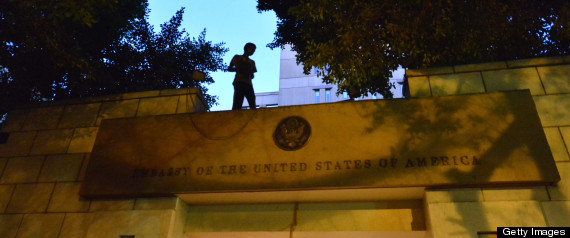CAIRO: Many of the world’s poorest countries host huge refugee populations, both in absolute terms and in relation to the size of their economies, United Nations High Commissioner for Refugees Regional Representative Mohamed Dayri said.
Dayri was speaking at a conference held by UNHCR in Cairo marking World Refugee Day on Monday. Other UNHCR representatives were simultaneously holding conferences around the world.
“More than 43 million people are displaced by violence around the world, the majority of which – around 80 percent – are hosted in developing countries not industrialized ones,” he said.
Pakistan, Iran and Syria have the largest refugee populations at 1.9 million, 1.1 million and 1 million respectively, stated the UNHCR’s 2010 Global Trends Report.
“We have seen this generosity recently in the response of Tunisians and Egyptians to people escaping violence in Libya, these two countries have received the majority of the approximately one million people who have fled the violence,” explained Dayri.
He also noted in his statement that 60 years ago, World War II has left millions of traumatized people homeless and displaced, when world leaders realized these vulnerable people needed special protection, thousands were resettled to new countries and the 1951 Refugee Convention was created.
However, today less than two percent of those leaving Libya are going to Europe.
Dayri recognized the hospitality of other countries including Bangladesh, Chad, Ecuador, Ethiopia, Iran, Jordan, Kenya, Nepal, Sudan and Syria. Pakistan has the biggest economic impact with 710 refugees for each dollar of its per capita GDP, in comparison to Germany, the industrialized country with the largest refugee population – 594,000 – has 17 refugees for each dollar of per capita GDP.
“This generosity is rooted in a shared humanity and a shared belief that there are no tolerable levels of suffering, it’s a recognition that even one person forced to flee war or persecution is one too many,” said Dayri.
He also pointed out that today’s “chronic conflicts are a cause of special concern” as new conflicts are arising while old ones are left unresolved, which leads to a new displacement on the one hand and millions of people being prevented from returning home on the other.
Fewer than 200,000 refugees went home in 2010, the lowest number in 20 years.
“In today’s world there are worrying misperceptions about refugee movements and the international protection paradigm,” said UN High Commissioner for Refugees, Antonio Guterres. “Fears about supposed floods of refugees in industrialized countries are being vastly overblown or mistakenly conflated with issues of migration. Meanwhile its poorer countries that are left having to pick up the burden,” he added.
However, industrialized countries make up all of the top global donors contributing to UNHCR programs, with the United States first followed by Japan and Sweden then the European Commission.
The top Arab donors are the United Arab Emirates, followed by Saudi Arabia then Oman.
Dayri urged the international community to step forward and act, whether by keeping their borders open to those seeking safety from violence or persecution or by providing solutions to long-term refugees.
“We need to invest in peace, people need to be helped to go home or to be given the chance to start new lives,” he asserted.
According to Dayri, there are currently 892 people escaping violence from Libya who are staying in Egypt at Saloum, who come from countries such as Eritrea, and so are not able to go back home. UNHCR is currently working on resettling these people; Sweden has already agreed to take 145 refugees and procedures are underway for resettling the rest in countries such as US and Canada.
Regarding those subjected to violence in Syria and going into Turkey, Dayri applauded the Turkish government and Red Crescent for offering all their services and not asking for any assistance.
From Sanaa, the head of the United Nations Information Center, Samir Al-Darabi, spoke about the situation in Yemen describing it as “rapidly deteriorating and the attention is decreasing even though the situation is getting further complicated.”
He said that there are more than 35,000 refugees in Sanaa who are being affected by the ongoing conflict.
June 20 is World Refugee Day, marking the occasion and this year’s 60th anniversary of the UN Refugee Convention on July 28, UNHCR is launching a six-month campaign aimed at promoting public awareness of the stories of individual refugees and other forcibly displaced people.

